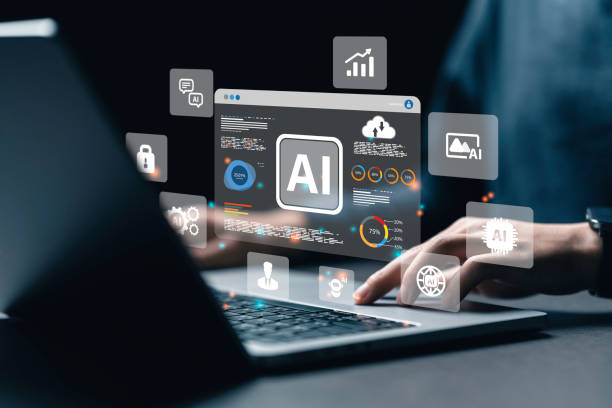What is Cloud Computing | DataOps IT

Cloud computing has already changed the way businesses store data, run applications, and manage IT resources. But now, the addition of Artificial Intelligence (AI) is taking cloud computing to a whole new level. This isn’t just a small improvement—it’s a major shift that is making cloud services smarter, faster, and more useful for businesses of all sizes.
What Happens When AI Meets Cloud Computing?
Cloud computing gives businesses access to powerful computing resources, storage, and applications through the internet. AI, on the other hand, is about teaching computers to learn from data and make decisions without human help.
When these two technologies work together, they create smarter cloud services that don’t just store data, but understand it, make predictions, solve problems, and help businesses work more efficiently.
How AI Automates Cloud Management
Managing cloud infrastructure used to require a lot of manual work: setting up servers, updating software, managing networks, and handling security. AI now helps by automating these tasks.
For example, cloud platforms like Amazon Web Services (AWS), Google Cloud, and Microsoft Azure use AI to monitor system health, predict how much computing power a business will need, and automatically fix problems if something goes wrong. This reduces human effort and makes cloud systems run more smoothly.

Stronger Security with AI
Security is a big concern in cloud computing. With so much data stored online, businesses are always at risk of cyberattacks.
AI helps improve security by continuously analyzing network traffic and spotting anything suspicious. It can detect strange login attempts or abnormal data transfers and stop hackers before they cause harm. Over time, AI gets better by learning from new kinds of cyber threats, making cloud systems safer without constant human monitoring.
Smarter Data Analysis
Cloud computing stores huge amounts of data, but having data isn’t enough. Businesses need to make sense of it. That’s where AI comes in.
AI helps by analyzing large datasets fast and finding important patterns. For example, a healthcare company can use AI in the cloud to analyze thousands of medical images and help doctors diagnose diseases faster. Financial firms can predict market trends by analyzing financial data in real-time. AI makes all of this easier and more accessible.
Better Resource Management
Cloud providers charge businesses based on how many resources they use, like computing power or storage. Without smart management, companies can end up paying for resources they don’t need or suffer slow performance because of not enough resources.
AI solves this by predicting when more resources will be needed and adjusting them automatically. So if an online store expects heavy traffic during a sale, AI will ensure enough servers are ready in advance to handle the load.
Easier Software Development
Building AI models from scratch is complicated and expensive. But now, cloud providers offer AI services ready to use, such as machine learning tools, image recognition, and language processing.
This means that businesses don’t have to be AI experts to benefit from it. A small startup can easily use AI-powered cloud tools to build smarter apps, speed up development, and offer new services without big investments.
Combining Edge Computing and AI
With more smart devices connected to the internet (like sensors, smart home devices, or industrial machines), it’s important to process data close to where it’s created. This is called edge computing.
AI helps by making fast decisions on the edge—like deciding whether a machine needs maintenance—while sending important information to the cloud for further analysis. This reduces delays and helps businesses act faster, combining the strengths of both cloud and edge computing.
Energy Savings with AI
Running cloud data centers consumes a lot of electricity. AI helps make cloud operations more energy-efficient by turning off unused servers, adjusting cooling systems, and optimizing workloads.
For example, Google uses AI to manage its data center cooling systems, reducing energy usage by up to 40%. This helps businesses lower costs and reduces the environmental impact.

Real-Life Industry Examples
- Finance: Banks use AI-powered cloud services to detect fraud and manage customer accounts automatically.
- Healthcare: Hospitals use cloud AI to analyze patient data and medical images, helping doctors diagnose diseases faster.
- Retail: Online stores use AI in the cloud to predict customer buying behavior, manage inventory, and personalize shopping experiences.
- Manufacturing: Factories use AI in the cloud to predict when machines need maintenance, reducing downtime.
Challenges Still Ahead
Even though AI and cloud computing offer many benefits, there are some challenges. Data privacy is a big concern, especially in industries like healthcare and finance. Also, AI models must be carefully monitored to prevent mistakes or bias in decision-making.
Moreover, AI models need more advanced cloud infrastructure to handle their growing size and complexity, so cloud providers are constantly improving hardware and software to support this growth.
Final Thoughts: Smarter Cloud for Everyone
Artificial Intelligence is no longer just an add-on to cloud computing. It has become a key part of how cloud services work today. AI makes cloud systems smarter, automates complex tasks, improves security, reduces costs, and helps businesses make faster decisions.
The combination of AI and cloud computing is helping businesses work smarter, faster, and more efficiently. As both technologies continue to grow, they will keep transforming the way we work, innovate, and solve problems.

